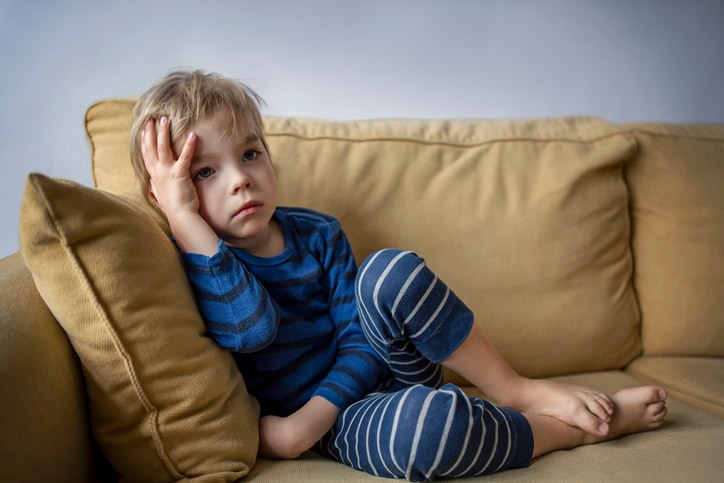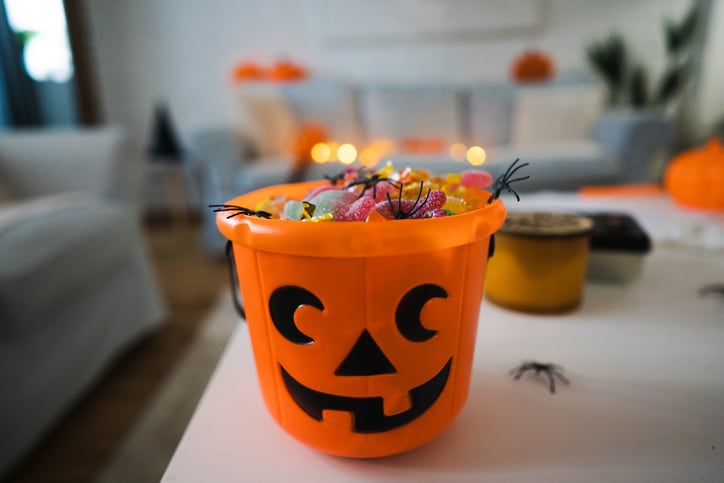It’s rare that a parenting style or choice isn’t divisive, but eggshell parenting is something parents and experts across the board agree is harmful. Not new in practice, Newport, California-based psychologist Kim Sage recently coined the term on TikTok in posts that have collectively been viewed over 5 million times (by many who note they themselves were raised by eggshell parents).
Whether you think you’ve been raised by eggshell parents or are worried about your own parenting, Sage and other experts break down this unhealthy form of parenting.
What is eggshell parenting?
“Eggshell parenting,” Sage explains, “is when a parent’s chronically unpredictable and/or highly inconsistent mood, mind, behaviors and relational state causes a child to become chronically hypervigilant in order to self protect in what is, essentially, or potentially, an unsafe, insecure environment.”
Eggshell parents are highly unpredictable, which in turn, Sage explains, can create “an emotionally/relationally/mentally/physically unsafe and insecure environment” for kids.
The “eggshell,” she adds, is derived from the phrase “‘walking on eggshells,’ which can describe what it feels like to be in a relationship with someone who struggles with providing emotional and relational consistency.”
According to Sage, eggshell parents may:
- Seem happy and fine one moment, and then suddenly angry the next, yelling and screaming, either at the child or in front of the child.
- Shame and blame a child for making mistakes, but perhaps earlier in the same day praised the child and told them they’re wonderful.
- Call a child (or adult child) loving names or say “I love you,” etc. one moment, and then later call them terribly abusive and hurtful names when they’re angry.
- Be OK with a behavior one day, and the next day become enraged by it.
Here, in one of her most-viewed posts, Sage talks about eggshell mothers who are chronically angry, yell a lot, have no boundaries and who also “expect you to be their best friend and/or therapist.”
“At its core, eggshell parenting often mirrors a disorganized attachment system, which is when the source of safety — in this case, the caregiver — is also the source of fear,” she says.
What are the lasting effects of eggshell parenting?
According to Carl Nassar, a Denver-based professional counselor, eggshell parenting is a “profoundly harmful way to parent that shapes not only the child’s short-term experience but their experience of others in the long term, as well.”
Here, experts share some of the ways this form of parenting can affect kids now and later on in life:
Anxiety
When kids grow up with a “push/pull” parent, anxiety is often a result, according to Jami Dumler, a licensed clinical social worker specializing in parenting, anxiety and trauma at Thriveworks in Bethlehem, Pennsylvania. The reason: Kids “never know which version of their parent will walk through the door, so they’re often confused and frightened, which in turn, can lead to anxiety.”
Over-involvement in the parent’s state of mind
Children with emotionally unpredictable parents can become “overly involved in their parent’s mood, relationships and world,” Sage says, which can result in enmeshment.
“Basically, the parent’s emotions, thoughts, behaviors and mood spill over into the child’s world,” she explains. “And in many cases, these children are often experiencing enmeshment with their parent, due to the inability of the parent to maintain a separate, healthy emotional and relational hierarchy between parent and child, as well as their inability to provide more secure attachment behaviors and responses.”
Relationship avoidance
Parents who are consistently inconsistent are confusing to children, and since their worlds are so small, kids with eggshell parents can ultimately blame themselves. This, eventually, can scare them away from relationships.
“When a child only sees his parents as gentle and then unexpectedly punishing, they often think: ‘There must be something wrong with me that is creating this reaction in my parents.’” says Nassar. “From a very early age, this environment can make the child feel there is no way to be safe in a relationship with mom and dad, and to reason that if mom and dad aren’t even safe, then surely no one can be.”
Hypervigilance
When a child doesn’t know what to expect from their parents and/or comes to fear their bad moods, they become chronically hypervigilant, Sage notes.
Here’s what a child may think, she says: Oh no, I hear the sound of slamming kitchen cabinets, tires screeching into the driveway, a deep sigh and eye roll. I know what’s coming next — my parent is going to start yelling and screaming at everyone. So, the minute I am playing with my Barbies and hear her slamming the doors, I have to run to my room, look busy, hide, leave the house or start doing chores.
“When a child doesn’t know what’s coming, they can never really relax in their own mind and body,” notes Sage.
According to Dr. Toya Roberson-Moore, physician leader at Pathlight Mood & Anxiety Center in Denver, volatile environments where kids come to be hypervigilant can result in:
- Social withdrawal.
- Fearfulness.
- Sleep disturbances.
- Difficulty concentrating.
Here, in another popular post of Sage’s, she talks about how this type of parenting often results in a “lifetime of hypervigilance … and a deep belief that there’s no such thing as real safety in relationships.”
Complex post-traumatic stress disorder (CPTSD)
When kids who grow up in emotionally unstable environments blame themselves for their parents’ behavior, they may develop complex PTSD or “relational trauma,” explains Sage.
“This type of relational trauma supports the idea of trauma and shame living inside our bodies, as well as our minds,” Sage says.
Symptoms of CPTSD, according to the Cleveland Clinic can be:
- Anxiety.
- Flashbacks or nightmares.
- Avoiding situations, places and other things related to the traumatic event.
- Heightened emotional responses, such as impulsivity or aggressiveness.
- Persistent difficulties in sustaining relationships.
People with CPTSD can also have extensive issues with:
- Emotion regulation.
- Identity and sense of self.
- Relationships.
What causes someone to become an eggshell parent?
As the case is with many parenting tendencies, eggshell parenting is often generational.
“Eggshell parenting most commonly comes from how they people were raised,” notes Dumler. “Our roadmap for relationships, attachment and parenting starts with our own caregivers and childhood because it’s all we knew. Until or unless a caregiver decides to do their own research on the best or most recommended parenting styles, they are often just going off the playbook their parents instilled in them from their own childhood.”
Dumler adds other causes of eggshell parenting may be:
- Addiction.
- Trauma.
- Intense stress.
- Mental health issues.
Breaking the eggshell parenting cycle
Does this type of parenting sound familiar? Maybe you had an eggshell parent or perhaps you recognize these behaviors in yourself or your partner. There are meaningful steps you can take to break the cycle — all of which start with recognition first and foremost, Dumler says.
“Part of recognizing where we need to improve as parents is also starting that healing journey for yourself,” she says. “It’s very likely this parenting style came out of childhood, due to trauma or unmet needs. Have compassion for yourself and then you can begin to take next steps.”
After that, Sage recommends the following four practical options:
1. Try talk therapy. Exploring your own childhood patterns of parenting and emotional dysregulation with a therapist can go a long way, Sage says, adding that developing self-compassion skills and tools and addressing unmet needs of childhood (via inner child work) can be helpful, as well.
2. Dialectical Behavior Therapy (DBT). DBT is a form of talk therapy thought to be particularly beneficial for people who experience intense emotions.
“Developing and using skills that are found in DBT, which are really about learning to develop mindfulness, interpersonal skills, distress tolerance and emotion regulation can be incredibly helpful,” she says.
3. Breathing and nervous system regulation techniques. These types of self-regulation methods, Sage notes, can help create moments of pausing and regulating before reacting. You are essentially creating a time out for yourself.
4. Own and repair. When you learn to own your mistakes and make repairs with your children along the way, you may find self-forgiveness. This can help reduce your own shame, Sage says, which may be interfering with accepting the reality of your struggle.
A final note: what an eggshell parent is not
Parenting is tough, and it can occasionally cause rage-based outbursts. This, Sage notes, is very different from being an eggshell parent.
“Most parents have bad parenting moments, lose it, get angry and yell — that does not make them eggshell parents,” she says. “The difference is the more extreme nature of a lack of predictability and a repeated overexposure to the parent’s state of mind and mood — often without repairs or change throughout all of childhood. These are chronic patterns, not isolated incidents.”






